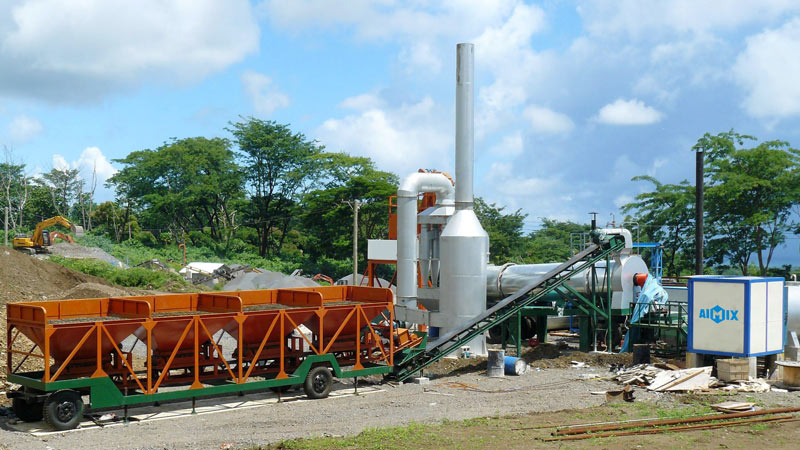In the road and bridge construction industry, choosing the right type of asphalt plant can determine the success or failure of a project. Whether you're handling municipal maintenance or building highways in remote regions, selecting between a mobile asphalt plant and a stationary one comes down to understanding your project scale, budget, and logistical needs. Each type has its advantages and trade-offs, especially in terms of pricing, performance, and flexibility. In this article, we break down the key differences to help you choose the right solution for your specific application.
Core Differences Between Mobile and Stationary Asphalt Plants
Before diving into costs and applications, it’s important to understand how mobile and stationary asphalt plants differ in structure and functionality. Both are designed to produce high-quality hot mix asphalt, but their construction and use cases are distinctly different.
What Is a Mobile Asphalt Plant?
A mobile asphalt plant(planta de asfalto movil) is designed for flexibility. Typically trailer- or skid-mounted, it can be transported from one job site to another. These plants are quick to install and dismantle, making them ideal for short-term projects or jobs in remote areas where asphalt supply from a central plant is impractical.
What Is a Stationary Asphalt Plant?
In contrast, a stationary asphalt plant is installed at a fixed location and used to supply asphalt for long-term or large-volume projects. These plants are generally larger, more powerful, and capable of producing higher daily output, making them suitable for infrastructure megaprojects like national highways or urban expressways.
Price Comparison: Mobile vs Stationary
Upfront Investment
- A mini asphalt plant, which falls under the mobile category, typically starts around $70,000 to $100,000 for basic models. These are ideal for smaller jobs and low-volume production.
- A standard mobile asphalt plant with medium capacity (60–120 TPH) ranges from $150,000 to $300,000 depending on features like automation, fuel systems, and emission controls.
- A stationary asphalt plant can cost significantly more—starting from $250,000 and going up to $800,000 or more for high-capacity units with advanced mixing and recycling systems.
Operating Costs
Mobile plants may offer lower setup and transport costs if you frequently work on remote or short-term projects. However, stationary asphalt plants(planta asfalto Perú) benefit from reduced wear and tear, consistent output, and lower per-ton production costs over time, especially when producing asphalt at high volumes.
Project Suitability and Use Cases
When to Choose a Mobile Asphalt Plant
A mobile solution is ideal if:
- You handle short-term or seasonal paving jobs
- Your work sites are spread across rural or remote areas
- You need to minimize asphalt transport time and costs
- You’re entering the market and want a lower initial investment
In such cases, a mini asphalt plant can be an excellent entry-level choice. It’s small, easy to relocate, and efficient enough for patching, small-scale roadwork, and municipal repair.
When a Stationary Asphalt Plant Is the Better Fit
Stationary plants shine in the following scenarios:
- Large-scale highway or airport construction with continuous output demand
- Long-term government infrastructure contracts
- Projects requiring advanced asphalt formulas or consistent mix quality
- Locations with access to raw materials and steady power supply
While a stationary asphalt plant may require a higher investment and longer installation time, it’s often the most cost-effective option for projects lasting several years.
Flexibility and Maintenance
Mobile plants offer ease of relocation and minimal downtime between projects. Their modular design allows quick assembly, especially valuable for contractors who frequently move between jobs. However, they may require more frequent maintenance due to road travel and environmental exposure.
Stationary plants, though less flexible, are built for durability and longevity. With proper foundation and routine care, they offer stable long-term performance and lower maintenance costs.
Conclusion: Choosing the Right Asphalt Plant
When deciding between a mobile asphalt plant and a stationary model, the key lies in evaluating your project duration, location, and budget. For short-term, mobile jobs in difficult-to-reach locations, a mini asphalt plant or standard mobile model is often the smartest move. But if your business focuses on long-term, high-output road construction, a stationary asphalt plant can offer greater reliability and cost-efficiency in the long run.
Get more information about mini asphalt plant: https://aimixgrupo.com/planta-de-asfalto/mini-planta-de-asfalto/


Comments
No comments yet. Be the first to react!